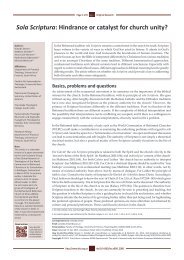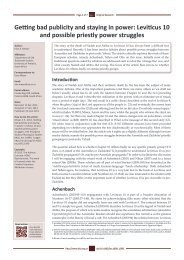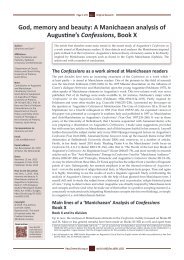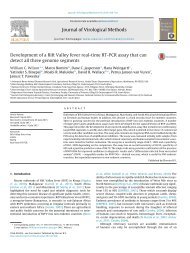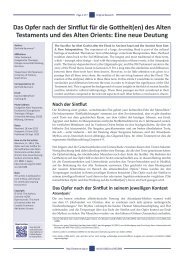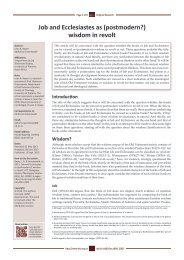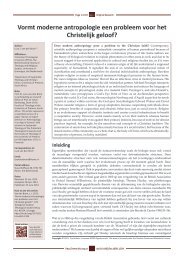View/Open - Repository.up.ac.za - University of Pretoria
View/Open - Repository.up.ac.za - University of Pretoria
View/Open - Repository.up.ac.za - University of Pretoria
You also want an ePaper? Increase the reach of your titles
YUMPU automatically turns print PDFs into web optimized ePapers that Google loves.
THE LAW OF PURCHASE AND SALE<br />
1061<br />
Revival <strong>of</strong> cancelled contr<strong>ac</strong>t<br />
In Fairoaks Investment Holdings (Pty) Ltd & another v Oliver &<br />
others 2008 (4) SA 302 (SCA), the key issue was whether an<br />
agreement for the sale <strong>of</strong> land could informally be revived where<br />
such agreement had lapsed by reason <strong>of</strong> the non-fulfilment <strong>of</strong> a<br />
suspensive condition.<br />
Streicher JA emphasized that e<strong>ac</strong>h trans<strong>ac</strong>tion has to be<br />
investigated to determine its true nature. If the intention is to<br />
proceed with the initial trans<strong>ac</strong>tion by way <strong>of</strong> withdrawing the<br />
cancellation and entering into a new contr<strong>ac</strong>t on the same terms<br />
as the cancelled contr<strong>ac</strong>t, such an agreement has to comply with<br />
section 2(1) <strong>of</strong> the Alienation <strong>of</strong> Land Act (para [19]). The same<br />
principle applies where the parties, after a contr<strong>ac</strong>t <strong>of</strong> sale <strong>of</strong> land<br />
has lapsed for non-fulfilment <strong>of</strong> a suspensive condition, agree to<br />
revive the lapsed contr<strong>ac</strong>t with amendments. Such an agreement<br />
results in a new deed <strong>of</strong> alienation <strong>of</strong> land. Hence, compliance<br />
with section 2(1) is compulsory (para [21]). (See Neethling v<br />
Klopper & others 1967 (4) SA 459 (A), where it was held that a<br />
contr<strong>ac</strong>t for the sale <strong>of</strong> land which had been cancelled could be<br />
revived by waiver <strong>of</strong> the rights created by the cancellation (the<br />
withdrawal <strong>of</strong> the cancellation as such), and that an agreement to<br />
do so did not constitute a new contr<strong>ac</strong>t which had to comply with<br />
the statutory formalities. All that the parties intend to do in this<br />
scenario is to continue with the existing written agreement <strong>of</strong><br />
sale.)<br />
That an agreement to which section 2(1) applies may be<br />
informally revived, was confirmed in Sewpersadh & another v<br />
Dookie [2008] 1 All SA 286 (D). Such informal revival is possible<br />
only if it does not involve the alteration <strong>of</strong> any <strong>of</strong> the material terms<br />
<strong>of</strong> the original written agreement (para [32]) and so can be<br />
effected by conduct (paras [30] and [32], with reference to<br />
Cronje v Tuckers Land and Development Corporation (Pty) Ltd<br />
1981 (1) SA 256 (W)). (On the nature <strong>of</strong> the test to determine<br />
whether an inference may be drawn from the conduct <strong>of</strong> the<br />
parties, see Muller v Pam Snyman Eiendomskonsultante (Edms)<br />
Bpk [2000] 4 All SA 412 (C); RH Christie The Law <strong>of</strong> Contr<strong>ac</strong>t in<br />
South Africa 5 ed (2006) 85.)<br />
The above principles were endorsed by Boruchowitz J in<br />
Spheris v Flamingo Sweet (Pty) Ltd & Another [2008] 1 All SA 304<br />
(W) at 309–10, with the caveat that once an agreement is<br />
cancelled, it cannot be revived unilaterally (Thomas v Henry &<br />
another 1985 (3) SA 889 (A)). Accordingly, whereas the cancella-



